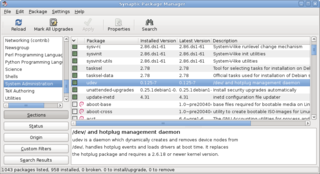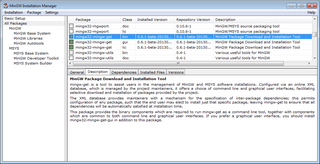
A Linux distribution is an operating system made from a software collection that includes the Linux kernel and often a package management system. Linux users usually obtain their operating system by downloading one of the Linux distributions, which are available for a wide variety of systems ranging from embedded devices and personal computers to powerful supercomputers.

Solaris is a proprietary Unix operating system originally developed by Sun Microsystems. After the Sun acquisition by Oracle in 2010, it was renamed Oracle Solaris.

A package manager or package-management system is a collection of software tools that automates the process of installing, upgrading, configuring, and removing computer programs for a computer in a consistent manner.

Portage is a package management system originally created for and used by Gentoo Linux and also by ChromeOS, Calculate, Sabayon, and Funtoo Linux among others. Portage is based on the concept of ports collections. Gentoo is sometimes referred to as a meta-distribution due to the extreme flexibility of Portage, which makes it operating-system-independent. The Gentoo/Alt project was concerned with using Portage to manage other operating systems, such as BSDs, macOS and Solaris. The most notable of these implementations is the Gentoo/FreeBSD project.

MinGW, formerly mingw32, is a free and open source software development environment to create Microsoft Windows applications.
Windows Management Instrumentation (WMI) consists of a set of extensions to the Windows Driver Model that provides an operating system interface through which instrumented components provide information and notification. WMI is Microsoft's implementation of the Web-Based Enterprise Management (WBEM) and Common Information Model (CIM) standards from the Distributed Management Task Force (DMTF).

Arch Linux is an independently developed x86-64 general-purpose Linux distribution that strives to provide the latest stable versions of most software by following a rolling-release model. The default installation is intentionally minimal so that users can add only the packages they require.

SCons is a computer software build tool that automatically analyzes source code file dependencies and operating system adaptation requirements from a software project description and generates final binary executables for installation on the target operating system platform. Its function is analogous to the traditional GNU build system based on the make utility and the autoconf tools.

OpenSolaris is a discontinued open-source computer operating system based on Solaris and created by Sun Microsystems. It was also, perhaps confusingly, the name of a project initiated by Sun to build a developer and user community around the eponymous operating system software.

BeleniX is a discontinued operating system distribution built using the OpenSolaris source base. It can be used as a Live CD as well as installed to a hard disk. Initially developed as a Live CD along the lines of Knoppix to showcase OpenSolaris technologies. Belenix went on to become the initial base for Sun's OpenSolaris distribution. A number of technologies pioneered in the Belenix project have gone on to become full projects in their own right within the OpenSolaris ecosystem.
Solaris Containers is an implementation of operating system-level virtualization technology for x86 and SPARC systems, first released publicly in February 2004 in build 51 beta of Solaris 10, and subsequently in the first full release of Solaris 10, 2005. It is present in illumos distributions, such as OpenIndiana, SmartOS, Tribblix and OmniOS, as well as in the official Oracle Solaris 11 release.

Software remastering is software development that recreates system software and applications while incorporating customizations, with the intent that it is copied and run elsewhere for "off-label" usage. The term comes from remastering in media production, where it is similarly distinguished from mere copying.
This is a comparison of notable free and open-source configuration management software, suitable for tasks like server configuration, orchestration and infrastructure as code typically performed by a system administrator.
An automounter is any program or software facility which automatically mounts filesystems in response to access operations by user programs. An automounter system utility, when notified of file and directory access attempts under selectively monitored subdirectory trees, dynamically and transparently makes local or remote devices accessible.
The Image Packaging System, also known as IPS or pkg(5), is a cross-platform package management system created by the OpenSolaris community in coordination with Sun Microsystems. It is used by Solaris 11 and several Illumos-based distributions: OpenIndiana, OmniOS, XStreamOS and a growing number of layered applications, including GlassFish, across a variety of Operating System platforms. IPS is coded in the Python programming language.

Salix OS is a multi-purpose Linux distribution based on Slackware.

OpenIndiana is a free and open-source illumos distribution descended from UNIX System V Release 4 via the OpenSolaris operating system. Forked from OpenSolaris after OpenSolaris was discontinued by Oracle Corporation, OpenIndiana takes its name from Project Indiana, the internal codename for OpenSolaris at Sun Microsystems before Oracle’s acquisition of Sun in 2010.
LuaRocks is a package manager for the Lua programming language that provides a standard format for distributing Lua modules, a tool designed to easily manage the installation of rocks, and a server for distributing them. While not included with the Lua distribution, it has been called the "de facto package manager for community-contributed Lua modules".












